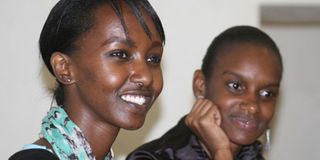Literary discourse : Read aloud until the children hear

Ms Maureen Karanja of Lit World ( left) with Prisca of Kenya Education Fund at Nation Centre on February 20,2015 . PHOTO: WILLIAM OERI
What you need to know:
For a book to qualify to be stocked in Litworld libraries and to be shared by its growing army of young readers, it must embody seven key attributes: It must inspire hope, a sense of belonging, confidence, sisterhood, courage and kindness and provoke curiosity in the young readers.
Mark Twain, it is said, once observed that the man — make that the woman as well — who does not read good books has no advantage over the man who can’t read them.
In a continent with one of the lowest literacy levels in the world, two young Kenyans are out to make a difference. They want to ensure that today’s children develop a life-long love for reading, so that when the children grow up, they can not only have an edge over those who cannot read but also that there will be very few illiterate Kenyans.
Every Sunday afternoon, Maureen Karanja, 26, and Prisca Mawia, 27, invite young readers from Kibera to the library that they have been running in the slum over the last four years.
They have only one goal; to nurture in the young slum dwellers a life-long love of books and reading because they believe that literacy is one way of fighting poverty.
However, not just any book will do, says Maureen, who, like Prisca, works as the Africa regional co-ordinator for the Kenya Education Fund and Litworld, two not-for-profit organisations that promote literacy and a reading culture among poor youth in the hope that this inspires them to live a life of hope, joy and independence when they are young and when they grow up. Kenya Education Fund also offers scholarships to needy students.
Financial limitations
For a book to qualify to be stocked in Litworld libraries and to be shared by its growing army of young readers, it must embody seven key attributes: It must inspire hope, a sense of belonging, confidence, sisterhood, courage and kindness and provoke curiosity in the young readers.
There are many such books in the world, but from Maureen’s experience after working in Kibera and at least four other towns in Kenya, such books are hard to come by in the country, and she is yet to understand why Kenyan publishers have not offered such story books yet they are so popular in her weekly book clubs and the holiday camps she organises for secondary school students and teenagers during school holidays.
“The books encourage children to do their best,” she says.
Besides, they also encourage the young readers to examine how the lessons they learn from the stories can shape their own lives for the better. And so, besides reading, she encourages children to author stories about their own lives and creating scenarios of the future they hope to build.
Being able to read is one thing, affording education is another thing altogether, and that is where the Kenya Education Fund comes in.
The organisation gives scholarships to students from poor families, giving them a chance to get an education despite the financial limitations that may afflict their families.
The fund is supporting over 700 learners in secondary schools and about 150 others in primary schools.
Although primary education is free in Kenya, Prisca says that some families are so poor that they find it difficult to put and keep their children in school either because they have no school uniform or do not have the food that is a precondition for their intellectual and social nourishment.
The beneficiaries in primary schools are mostly assisted to meet such basics through school feeding and other forms of support to keep them in school.
Both Maureen and Prisca are inspired by the words of Pam Allyn, an American author who also founded Litworld and whose motto is: “Words changing the world”.
According to Pam, “reading is like breathing in and writing is like breathing out: story telling is the key that links both.”
Guided by this, Maureen and Prisca organise reading activities in a way that injects fun.
They have even found a way of arranging books in their library so that they are not intimidating to young readers. Initially, all books were arranged according to the traditional categories: author, genre, index number and so on.
However, they found that children were interested in topics, such as pets, sports and games and so on, so they started arranging the books, not in rows upon rows of shelves but in baskets, each clearly and simply labelled according to the topics.
And besides reading and writing, they engage the children in singing games and other fun activities, all aimed at making reading engaging and entertaining and ingraining it in their day-to-day life activities.
Provoking creativity bug
Now, both Litworld and the Kenya Education Fund are organising a reading aloud event to be marked in all the countries where Litworld operates on March 4. Known as the World Read Aloud Day, this year’s event will be held at Ayany Primary School in Kibera between 9am and 11am to ensure that other school programmes are not disrupted.
In the past, Maureen says, organisers of the event, primarily meant to make reading fun and to spread its benefits, would visit individual schools briefly.
This year, however, they have changed tack. All the participating schools — about 15 of them — will congregate at Ayany for the special event during which local musicians are also expected to perform.
“This year we will have a challenge, where young readers will create the end of a story they have read,” says Prisca. The aim, Maureen says, is to provoke the creativity bug in the children.




